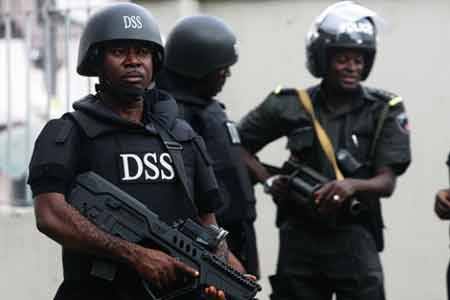Security & Crime
DSS brings back suspected mastermind of Kano mosque bombing for re-arraignment after 9 years

Husseni Ismaila, also known as Maitangaran, the alleged mastermind of the 2014 Kano bombings, was re-arrested by the Department of State Services (DSS) on Wednesday at the Federal High Court in Abuja.
When the matter was called, Mr. E.A. Aduda, the prosecutor, told the judge that the DSS had filed an updated charge against the defendant, which included four counts, and he asked for the charge to be read to the defendant so that he might enter a plea.
The four counts were read in part, and the defendant entered a not guilty plea to each one:
“That you, Husseni Ismaila, 34-year-old male, alias Maitangaran, professed to be a member of Boko Haram, a terrorist organisation, in violation of the Terrorism Prevention Act of 2013 and subject to punishment under that same act.”
Read Also: FG holds meeting with NLC and TUC regarding nationwide strike
“That in 2014, you, Husseni Ismaila, 34-year-old male, alias Maitangaran, directly took part in an act of terrorism and released a video message in which you admitted to the crime of bombing the Kano Central Mosque.”
Numerous Nigerians died as a result of this, including police officers. The act is punished under the Terrorism Prevention Act, 2013 for violating Section 1(2) (8) of the same statute.
Given the defendant’s not guilty plea, the prosecutor asked the court to allow the trial to continue.
However, Mr. Peter Dajang, the defence attorney, informed the court that the prosecution had disregarded a legitimate court order, and that the trial should be stopped.
Dajang claims that on December 6, 2021, the prosecution was given an order by the court to move the defendant from its custody to the Kuje Correctional Centre.
He explained that this was so that his solicitors and relatives could see him, but since the defendant was still in their care, the DSS had not yet complied with the order.
He went on to say that the prosecution had not appealed the court’s order at the time it was issued and that the court was not entitled to hear arguments against its own decision.
Additionally, the defence attorney claimed that because the order was issued on December 6, 2021, and the prosecution had only six days to request a change, the court lacked jurisdiction to consider the prosecution’s application.
“If the prosecution planned to file a request for a variation, they should have done so within the allotted six days.
Looking at the application, which was submitted seven months after the order was issued, there isn’t a request asking the court for permission to submit the application beyond the deadline.
Additionally, we contend that a court’s order represents the court’s ultimate ruling. There were representatives present when the decision was reached.
Given that the deadline for filing an appeal has long since past, the right course of action was to appeal the ruling rather than asking the court to sit on appeal over its ruling.
However, because he had filed an application asking the court to alter the order, the prosecuting attorney informed the court that the order had not yet been followed.
The judge postponed making a decision on the motion to modify the order directing the defendant’s transfer to Kuje until January 25, 2024.
He also scheduled the substantive matter’s continuation until February 7, 2024.
